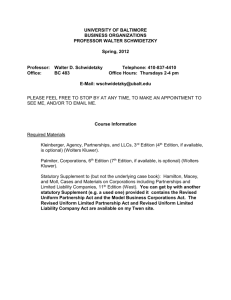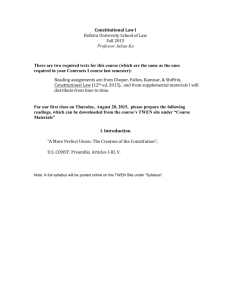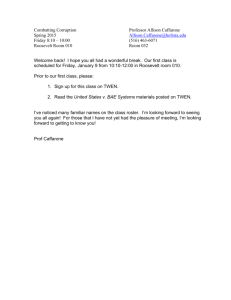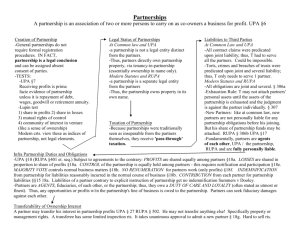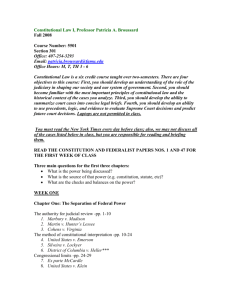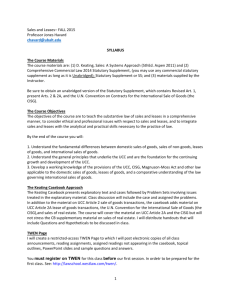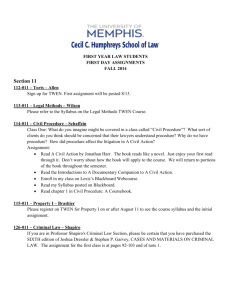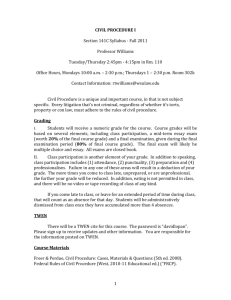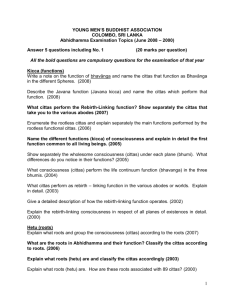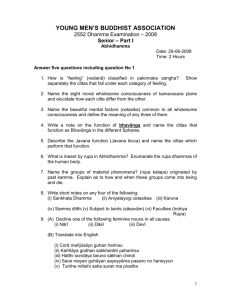Schwidetzky - University of Baltimore School of Law
advertisement
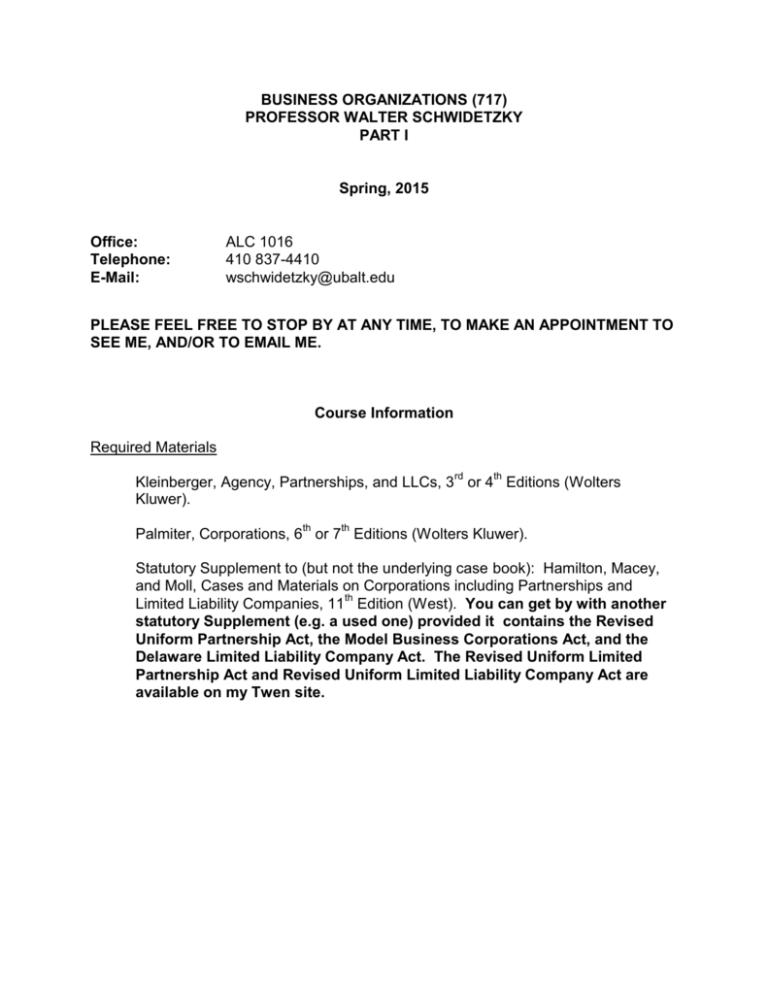
BUSINESS ORGANIZATIONS (717) PROFESSOR WALTER SCHWIDETZKY PART I Spring, 2015 Office: Telephone: E-Mail: ALC 1016 410 837-4410 wschwidetzky@ubalt.edu PLEASE FEEL FREE TO STOP BY AT ANY TIME, TO MAKE AN APPOINTMENT TO SEE ME, AND/OR TO EMAIL ME. Course Information Required Materials Kleinberger, Agency, Partnerships, and LLCs, 3rd or 4th Editions (Wolters Kluwer). Palmiter, Corporations, 6th or 7th Editions (Wolters Kluwer). Statutory Supplement to (but not the underlying case book): Hamilton, Macey, and Moll, Cases and Materials on Corporations including Partnerships and Limited Liability Companies, 11th Edition (West). You can get by with another statutory Supplement (e.g. a used one) provided it contains the Revised Uniform Partnership Act, the Model Business Corporations Act, and the Delaware Limited Liability Company Act. The Revised Uniform Limited Partnership Act and Revised Uniform Limited Liability Company Act are available on my Twen site. Class Preparation It is important to keep your class preparation current. Much of the course will be built on subjects previously discussed, and many statutes work in conjunction with one another. If you miss and/or do not prepare for one class, the next class may use terms and concepts you do not understand, which will compound the difficulty of understanding the area under discussion. Exams/Grading You will be given Apush points@ (up to a half-grade) for doing an especially good (or bad) job in class. There will be one three-hour, multiple-choice exam given at the end of the semester. Your grade will be based on your performance on the final exam, plus or minus push points. Attendance Class attendance is a primary obligation of each student whose right to continued enrollment in the course and to take the examination is conditioned upon a record of attendance satisfactory to the professor. Students are required to abide by the Law School’s attendance policy. A student who exceeds the maximum allowable absences may be compelled to withdraw from the course or may be barred from sitting for the final exam. Students who are forced to withdraw for exceeding the allowed absences should receive a grade of WA (withdrawal due to excessive absences), unless the faculty member believes that a grade of WF is warranted. A sign in sheet will be handed out in each class. You may sign the sign-in sheet during class or at the end of class while I am still in the classroom, but not after I have left the classroom. TWEN Site This course has a TWEN webpage that links to this syllabus, announcements, Powerpoint slides, and other class materials. You are required to register for this course on TWEN, and you must use your UBALT email address as your TWEN e-mail address as per University Policy. You are responsible for all information posted on or disseminated from TWEN. To sign up for TWEN, take the following steps: 1) Log on to Twen (via lawschool.westlaw.com) 2) Click ADD COURSE 3) Select the course page 2 4) Scroll and click SUBMIT Computers You may use computers in class and on the exam. Class Cancellation If I must cancel a class, notices will be sent to students via email and posted on the classroom door. If there is inclement weather, students should visit the University of Baltimore web page or call the University's Snow Closing Line at (410) 837-4201. If the University is not closed, students should presume that classes are running on the normal schedule. Academic Integrity Students are obligated to refrain from acts that they know or, under the circumstances, have reason to know will impair the academic integrity of the University and/or the School of Law. Violations of academic integrity include, but are not limited to: cheating; plagiarism; misuse of library materials; use of another’s book or study materials without consent; unapproved multiple submissions; material misrepresentation of one’s academic history or standing; misrepresentation of any academic matter; intentionally giving another student false or inaccurate information about class requirements; inappropriate discussion of exams; and misrepresenting or falsifying class attendance reports. Disability Policy If you are a student with a documented disability who requires an academic accommodation, please contact Leslie Metzger, Director for Student Support in the Office of Academic Affairs at 410-516-5623 or via email at lmetzger@ubalt.edu. RUPA v. UPA There are two Uniform Partnership Acts, UPA (1914) and UPA (1997). The latter is often called RUPA (Revised Uniform Partnership Act). We will focus on RUPA, which is more widely adopted. In general, you may skip that materials on the UPA in the book unless they are necessary to understand the RUPA rules. In all cases, answer problems using RUPA not UPA. You may want to, but you are not required to read the comments after each RUPA section. 3 PROBLEMS IN BOOKS Each segment of the course will include a problem set I have created. You are not required to do the problems in the Kleinberger and Palmiter books, though you may wish to in order to improve your understanding. Many of the problems I assign are very similar to the ones in those books. CASES Assigned cases will be on the Twen site. You are responsible for printing these out and reading them. 4 ALL TEXT ASSIGNMENTS IN I-IV ARE TO THE KLEINBERGER BOOK EXCEPT AS NOTED. Class 1 I. AGENCY 1. 2. 3. 4. 5. Chapter 1. Restatement 3d § 1.01. A. Gay Jenson Farms Co. v. Cargill, Inc. Green v. H&R Block. Agency Problems 1-5. Class 2 6. Chapter 2 (skim 2.6). 7. Restatement 2d §§ 4, 6, 8, 27, 34, 297 8. Restatement 3d §§ 1.03, 1.04, 2.01-2.03, 3.11, 6.11 9. Case: Truck Crane Service Co. v. Barr-Nelson 10. Agency Problems 8-14 Class 3 11. 12. 13. 14. 15. II. Agency Problems 15-19. Chapter 5. Restatement 2d §§ 120-122, 133-135. Restatement 3d §§ 3.06-3.08. Agency Problems 20-23. THE (GENERAL) PARTNERSHIP A. Introduction 1. Chapter 7. 2. Statutory Supplement, RUPA '' '' 201-204, 306. 3. Partnership Problems 1-2. Class 4 4. Fenwick v. Unemployment Compensation Commission. 5. Ziegler v. Dahl. 6. Partnership Problems 3-8. 5 B. Financial Aspects 1. Chapter 8.1-8.3. 2. Statutory Supplement, RUPA '' 401, 204. 3. Partnership Problems 9-11. Class 5 4. 5. 6. 7. 8. 6 Kessler v. Antinora. Schymanski v. Conventz. Partnership Problems 12-14. Statutory Supplement, RUPA §§ 501-504 Partnership Problems 15-16. C. Management and Fiduciary Duties 1. Chapter 9.1-9.5.2. 2. Statutory Supplement, RUPA '' 403, 404, 401(c),(f),(i),(j), 301, 104, 801(5)(ii), 305, 306, skim 503, 103, 405 3. Summers v. Dooley. 4. Partnership Problems 17-19 Class 6 4. National Biscuit Company v. Stroud. 5. Partnership Problems 17-28. Class 7 D. Disassociation and Dissolution 1. Chapter 11.1, 11.9-11.12. 2. RUPA Articles 6, 7, and 8. 3. Wood v. Apodaca. 4. Partnership Problems 29-43. Class 8 III. THE LIMITED PARTNERSHIP AND FUN TAX STUFF 1. Chapter 12.1-12.2. 2. RULPA (1976/1985) §§ 1105, 403, 104, 201, 502, 605, 608, 303, 304, 503, 702, 602-604, 801. 3. Labovitz v. Dolan. 4. In re USACAFES. 5. Limited Partnership Problems 1-8. Class 9 6. Article: Integrating Subchapters K and S, Just Do It. 7. Chapter 13.1.1-13.1.2. 8. Chapter 2 in Palmiter book. 7
